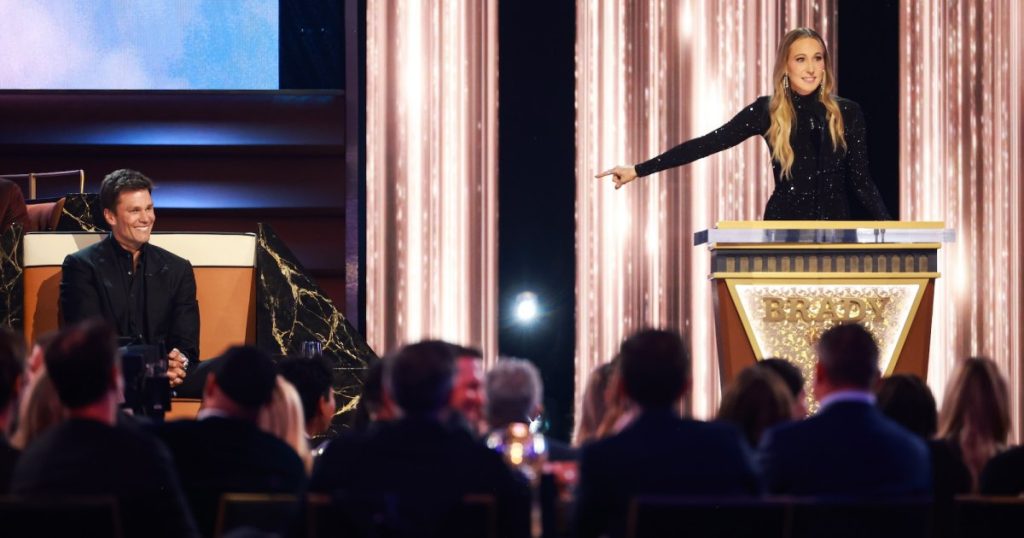Nikki Glaser’s career trajectory took a dramatic upswing following her memorable performance at the Roast of Tom Brady in May 2024. The comedian, previously known but not a household name, experienced a surge in popularity that she likened to the fame of pop superstar Taylor Swift. Her appearance on Jimmy Kimmel Live in December 2024 served as a platform to reflect on this whirlwind experience, describing the roast as a “life-changing performance” that led to a cascade of opportunities, including a theater tour with numerous dates and the prestigious gig of hosting the Golden Globes in January 2025. The roast, which aired on Netflix, catapulted Glaser into a new level of recognition, with people readily identifying her in public and encountering her image circulating on social media. This newfound fame was a direct result of her sharp and often controversial jokes targeting the NFL legend.
Glaser’s roast material centered on sensitive aspects of Brady’s life, including his high-profile divorce from supermodel Gisele Bündchen and a significant financial loss related to cryptocurrency. One particularly biting joke referenced Bündchen returning her wedding ring, a symbolic representation of their broken marriage. While the roast format encourages pointed humor, the intensely personal nature of Glaser’s jokes, particularly those referencing Brady’s children, drew criticism from the quarterback himself. Brady admitted to enjoying jokes directed at him but expressed regret over the impact the roast had on his children, highlighting the unintended consequences of his participation. This created a complex dynamic between the comedian and her target, raising questions about the boundaries of humor and the responsibility of performers in such public forums.
The fallout from the roast revealed a divergence in perspective between Glaser and Brady. While Brady expressed remorse, Glaser maintained that she operated within the agreed-upon parameters of the roast. She emphasized that Brady’s consent to participate implied an acceptance of potentially sensitive material, especially in the absence of explicitly defined boundaries. In her view, the roast format grants comedians license to explore sensitive topics, and she felt justified in her approach, arguing that she wouldn’t have ventured into such personal territory without Brady’s implicit permission. This difference in understanding underscores the inherent challenges of roast comedy, where the line between playful ribbing and potentially hurtful commentary can be blurred.
Glaser’s response to Brady’s concerns, articulated on the “Fresh Air” podcast, further clarified her stance. She emphasized that she interpreted Brady’s participation as an implicit endorsement of her comedic approach. She believed that by agreeing to be roasted, he gave her the freedom to explore various aspects of his life, even those that might be considered sensitive. Glaser also acknowledged on “Today With Hoda & Jenna” that Brady might not have fully anticipated the potential backlash from his family and the emotional impact it would have on them. This demonstrated a degree of empathy for Brady’s situation while still defending her comedic choices within the context of the roast.
The Brady roast served as a pivotal moment in Glaser’s career, propelling her into the spotlight and solidifying her reputation for bold and unflinching comedy. However, it also sparked a conversation about the ethical considerations of roast humor and the potential consequences of targeting personal vulnerabilities. Brady’s reaction highlighted the complex interplay between comedian and subject, where the pursuit of laughter can sometimes intersect with personal sensitivities. The incident underscored the delicate balance required in roast comedy, where the intention is to entertain but not to inflict lasting emotional harm.
In the aftermath of the roast, Glaser’s career flourished, demonstrating the power of controversy in generating attention and opportunity. While the incident raised valid concerns about the boundaries of humor, it also served as a testament to Glaser’s comedic talent and her ability to capitalize on a high-profile platform. The roast, while controversial, proved to be a turning point, transforming Glaser from a relatively known comedian into a sought-after entertainer with a significantly elevated profile. This trajectory exemplifies the complex and sometimes unpredictable nature of the entertainment industry, where both talent and controversy can play a role in shaping a performer’s career.










